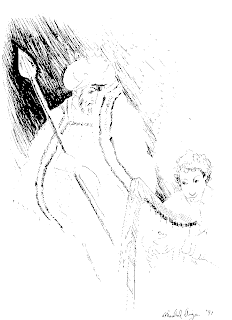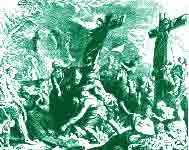WISHING TO BE JONAH
 28 February 2007
28 February 2007Wednesday in the 1st Week of Lent
WISHING TO BE JONAH
Jon 3:1-10/Lk 11:29-32
The story of Jonah is one of my favorites in the Old Testament. In the First Reading today is part of that story. God called Jonah to call the people of Nineveh to repentance. Jonah, however, tried running away from God. God caught up with Jonah though. The First Reading today is very beautiful because it tells us that eventually the Ninevites caught up with God too. At the preaching of Jonah, the people of Nineveh repented from their sins.
How I wish we were living in the time of Jonah. It seemed so easy then to convince people to turn away from sin and be more faithful to God. When Jonah preached to the Ninevites, the king even issued a decree for all the people of Nineveh to fast, including himself! Thus, the Ninevites – from the highest official to the ordinary citizen – fasted and put on sackcloth as a gesture of national mourning and penance for their individual and collective sins. They hoped that God would change His mind about an impending chastisement. Not wishing the death of the sinner, God changed His mind.
But times have changed. Preaching from the pulpit is more mellow, and, more and more, preachers are becoming more accommodating of their listeners. What really is more important nowadays: what the listeners want to hear or what the listeners should hear? And what should they hear anyway?
Times have changed. Quite often, a thousand homilies amount to no change at all in the lives of their hearers. Jonah preached just once and the Ninevites repented and amend their ways! Wow! How I wish I were Jonah, except the three days in the belly of a big fish.
Nowadays, quite a number of people gauge an inspiring homily on the basis of the number of jokes they hear from the preacher. Some people frown at preachers who preach about the horror of sin while others flock to listen to preachers who provide endless comic relief. For preachers who talk about evil in the world and our common need for repentance and conversion of life, it can be very difficult to attract listeners. It is very difficult to talk about guilt without sugarcoating, but it is even more difficult to convince the guilty.
The dramatic changed could already be seen even during the time of Jesus. His generation would not take His words seriously unless they see a sign. What sign were they demanding from Jesus? They were demanding a sign from Him to prove that He was what He claimed to be: the Son of God.
Jesus pointed back to Jonah. Jonah was the sign He gave them. And because Jonah was merely a sign, Jesus was the reality that Jonah was pointing to and, therefore, greater than Jonah. Of course, Jonah was not aware that he was pointing to Jesus when the events in his life happened. But God preached to the Ninevites not only through the words that Jonah spoke to them but through Jonah’s life all together. Jonah was God’s homily. And that homily pointed to Jesus.
As I reflect on my ministry of preaching, I do not hold my listeners totally accountable for making my homilies fall on deaf ears. Rather, I honestly confess that I am part of the blame. Perhaps, my life is not a good homily for them to hear and see. We all need to repent and be converted. This is very much a Lenten call for us individually and collectively.
Let us be signs that point to Jesus and not to our selves. Let us be signs by not only our words but also, most of all, by our deeds.
How I wish I were Jonah. How I wish that when people remember me, they remember not me but how Jesus preached to them, and say, “That was one good homily. I cannot help but answer the call of Jesus to strive to be more holy.”
Well, okay, if Jesus needs me to stay in the belly of a big fish for three days, so be it. I know, He has a point to make, so important that no one should ignore. Can anyone really ignore?







.gif)










